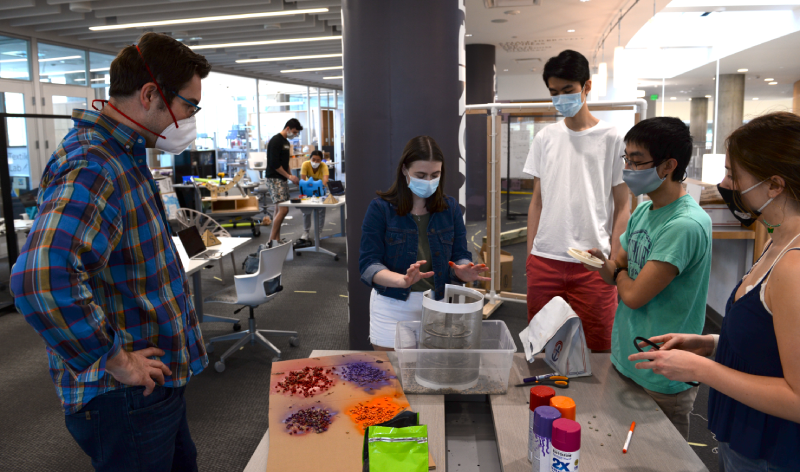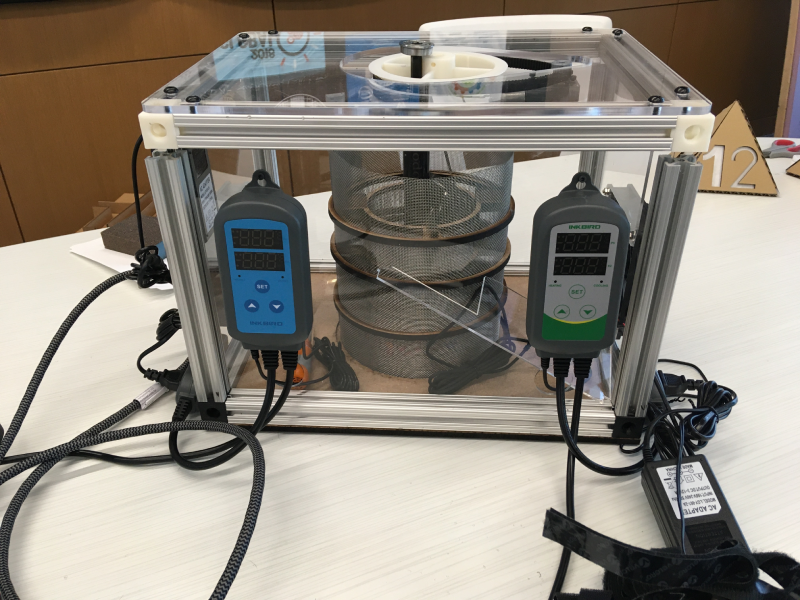By Shateara Hall

In Kevin Galloway’s “How to Make (Almost) Anything and Make it Matter” class at the Wond’ry, Vanderbilt’s Innovation Center, a team of undergraduate students learned that coffee is not just a beverage you drink in the morning. Coffee is the seed of a fruit, a global industry, the foundation of a way of life for millions of people around the world and a pathway to learning how to use the tools of human-centered design in pursuit of meaningful innovation.
Through a partnership between the Coffee Equity Lab at the Wond’ry and the Del Fuego Project—a Yepocapa, Guatemala-based nonprofit that’s building capacity in small-holder farming communities—students in Galloway’s spring 2021 course engaged in collaborative design to generate innovations in coffee processing.
The Coffee Equity Lab at the Wond’ry is an experiential lab that combines research, practice and teaching to tackle complex equity challenges for all actors in the coffee sector. For students, the lab offers opportunities to understand and engage in the issues shaping our world through the lens of the global coffee sector.
“Through this course and project, students realized the opportunity to apply their interdisciplinary academic backgrounds and personal experiences to a real-world challenge—generating meaningful prototypes for a table-top coffee processing machine that may help connect small coffee farmers with valuable coffee quality information,” said Hanes Motsinger, leader of the Social Innovation Practice at the Wond’ry and cofounder of the Coffee Equity Lab.
“My favorite part of working on this project has been the hands-on nature of it! It’s been really awesome to apply lots of the things I learn in my mechanical engineering classes to solve a real-world problem. My team has also been amazing at bouncing ideas back and forth in an interdisciplinary group filled with diverse educational backgrounds.”
Solving problems
Guided by research in coffee horticultural sciences and farm profitability, the Del Fuego Project works alongside small-holder coffee farming communities to create evidence-based pathways for farm profitability through improved management and quality enhancement techniques.
At the organization’s Coffee Quality Lab, the team is creating a controlled coffee processing environment where small-holder coffee producers may bring two to three pounds of coffee-in-cherry and evaluate its quality by industry standards.
To achieve this goal, executive director and founder Taya Brown presented students with a challenge: design a tabletop coffee drying station allowing coffee in parchment to be dried to industry standards in a climate-controlled environment with limited space. For the student team, it was the first time for many to have an insight into coffee production. Upon learning about electricity limitations in the region, students pivoted from advanced robotics approaches to using energy-saving designs.
“The Del Fuego Project got the benefit of student intellect and expertise while students were given the opportunity and experience to make real impact in the lives of famers,” Brown said of their collaboration. The small-scale coffee processing operation provides coffee farmers with invaluable information on the quality of their coffee, which they can use to negotiate better sales.
Getting hands-on
Galloway’s HMAA course builds student proficiency with “maker” tools and how to connect them with the human-centered design mindsets promoted in Vanderbilt’s Design as Immersive Vanderbilt Experience program. Students learn 2D (AutoCAD) and 3D (SolidWorks) computer-aided design platforms and explore several methods for converting digital designs into physical prototypes. Students work with laser cutters, 3D printers, molding and casting polymers, vacuum forming, composite manufacturing and sewing techniques. Following the DIVE framework, students use these skills to quickly generate prototypes to converge on potential solutions for their client.

“My favorite part of working on this project has been the hands-on nature of it! It’s been really awesome to apply lots of the things I learn in my mechanical engineering classes to solve a real-world problem,” said Andy Du, a rising senior majoring in mechanical engineering. “My team has also been amazing at bouncing ideas back and forth in an interdisciplinary group filled with diverse educational backgrounds.”
Challenging status quo
Bringing students together from different disciplines allowed for original ideas in service to the needs of the Del Fuego Project. In addition to Du, the team was composed of students Brianna Finocchiaro, Gabby Seberger and Justin Law, who are majoring in human and organizational development, mechanical engineering, and computer science and cognitive studies, respectively.
“I enjoyed learning from Andy, Gabby and Justin during this process, but also recognizing that I still can contribute to the success of this engineering-centric project as an HOD major,” Finocchiaro said. “I am also really appreciative of the opportunity to present our ideas and iterations to the Del Fuego Project staff to incorporate their feedback and better serve their needs. Overall, I hope that this experience will represent the first of many interdisciplinary teams that I can work on during my educational and professional career.”
“From the start, the coffee team embraced the design-thinking mindset and used their creativity and curiosity to explore a broad range of ideas,” said Galloway, research assistant professor of mechanical engineering and director of making at the Wond’ry. “As an instructor it’s rewarding to see them develop an amazing functional prototype in less than 14 weeks—and to see them catch on to the power of prototyping as a tool for thinking by rapidly building and testing ideas.”
Innovating with impact
Brown was most impressed with the students’ integration of a unique screw technique for drying the coffee in the appropriate time. Months after the conclusion of the project, she is brainstorming on how to integrate something similar in the washing stations to eliminate human driven paddling in the coffee washing process and would love to have the students continue to partner with future initiatives.
“I hope that by creating a simple machine, we can teach farmers throughout the region how to create their own coffee dryers without in-person guidance,” Law said. “In the future, I would love to visit Guatemala to meet the farmers to hear their firsthand experiences with coffee growing and help them with the other steps of coffee processing.”
The Coffee Equity Lab builds on the Vanderbilt Institute of Coffee Studies’ 15-year legacy of coffee research and is co-founded by Motsinger and Ted Fischer, Cornelius Vanderbilt Professor of Anthropology.